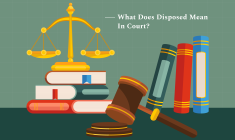When most folks picture criminal law, it’s all courtroom drama—lawyers pacing, judges with that “order in the court” energy, and maybe someone objecting just a little too loudly. But honestly, that’s just one slice of a much bigger pie. There’s a whole world of criminal justice work that happens quietly—no gavels, no suits, no shouting.
And if you’re someone who’s interested in the field but doesn’t exactly dream about standing in court, you’re not out of the game. Far from it. There are different careers in criminal law out there that matter just as much—maybe even more—and they happen far from the judge’s bench.
Here Are Some Of The Careers In Criminal Law You Can Choose
Careers in criminal law can be diverse. It can range from investigation and law enforcement to legal practice.
The roles can include lawyers from both prosecution and defense, police officers, judges, criminal investigators, victim advocates, and correction officers. Here are some of the options mentioned.
1. Criminal Justice Roles That Don’t Require a Gavel
Not every job in this space involves yelling “Your Honor.” Some are more personal, more hands-on, and honestly, a lot more grounded in everyday life.
Take parole officers, for one. They meet with people who’ve done their time and are trying to stay on track. It’s less about rules and more about helping someone find a way forward without slipping back.
Then you’ve got victim advocates. They’re the ones who sit with someone who’s been through the worst and walk them through the mess of the legal system. Not fixing everything—just being there, explaining things, making it bearable.
Youth correction counselors? Yeah, they deal with teens in trouble. But it’s not just about discipline. It’s about second chances. Helping a kid who made a bad call figure out what’s next—and how to not end up back in that same place.
And if this kind of work sounds like something you’d actually want to do, there’s a fully online criminal justice degree from William Paterson University that’s pretty doable, especially if you’re already working or have family stuff to juggle.
It’s not just textbooks either—they mix in real-world know-how with a bigger look at why this system works (or doesn’t). However, if this kind of work interests you, you should get a bachelor degree in criminal justice.
2. Jobs That Focus On Prevention And Support
Here’s the thing: some of the most important work in criminal justice is the stuff that stops problems before they spiral.
Let’s say you’ve got a crime prevention specialist. Sounds fancy, right? But it’s pretty boots-on-the-ground stuff—meeting with local folks, figuring out where things might go sideways, and putting plans in place to keep things calm.
A lot of them work for cities or departments, and they’re usually the ones setting up safety events or school programs.
Then there’s the community outreach crowd. These are the people who step in when the relationship between cops and residents is, well… tense. They talk. They listen. Sometimes that’s all it takes to start building trust again.
And social service coordinators? They’re lifesavers, honestly. When someone’s about to end up in jail—not because they’re dangerous, but because they’ve got nowhere else to go—these folks help them land on their feet. Maybe it’s rehab. Maybe it’s a shelter. It’s not always neat, but it’s better than a cell.
If you’ve got some people skills and a heart that leans toward “let’s fix this,” then these roles hit different.
3. Behind-The-Scenes Research And Policy Careers
Now, maybe you’re not really a “people person.” Maybe you like patterns, data, and questions that don’t have easy answers. Good news: this field has space for that too.
Criminal justice researchers are the ones asking big questions: Are these laws fair? Is anyone actually getting rehabilitated? What even works anymore? Is there sentencing fairness in all cases?
They collect data, interview people, and analyze policies—it’s deep work, but necessary. Their insights help shape everything from prison reform to police training.
Then you’ve got policy analysts—basically the bridge between the numbers and the real world. They take all that info, figure out what it means for actual people, and try to steer laws in a better direction. Doesn’t always go smoothly, but someone’s gotta do it.
And now, with more departments using data to track trends or figure out where help’s needed, there’s a growing need for people who can wrangle those numbers. So yeah, if you’re into spreadsheets and crime stats, there’s a place for that too.
4. Non-Profit And Private Sector Opportunities
Criminal justice isn’t just a government thing. A lot of good work happens outside the system entirely, through nonprofits or even inside big companies.
Think about reentry programs. People get out of prison and need help starting over—jobs, housing, maybe even just someone to show them how to use a smartphone. Program coordinators are there for that messy middle part.
Then there are legal outreach assistants working in shelters or advocacy groups. They help people who usually fall through the cracks—immigrants, survivors, people without homes—understand their rights and navigate the system without getting crushed by it.
On the flip side, the private sector’s not sleeping on this either. Security analysts are in demand, especially in industries like finance and healthcare. These are folks using their justice background to protect company assets, flag risks, and build safer workplaces.
If you want to do work that means something, but also need that paycheck stability, this could be your sweet spot.
Which One Will You Choose?
Not everyone belongs in a courtroom—and that’s honestly a good thing. This field needs people in schools, shelters, offices, and everywhere in between. People who can show up, think critically, listen closely, and push for something better.
So yeah, if you care about justice but don’t see yourself in front of a judge? That’s not a flaw. There are a lot of careers in criminal law, and you can pick one that suits you. It’s a sign you’ve got something different to offer. And in this line of work, that’s exactly what we need.
Read Also:
















